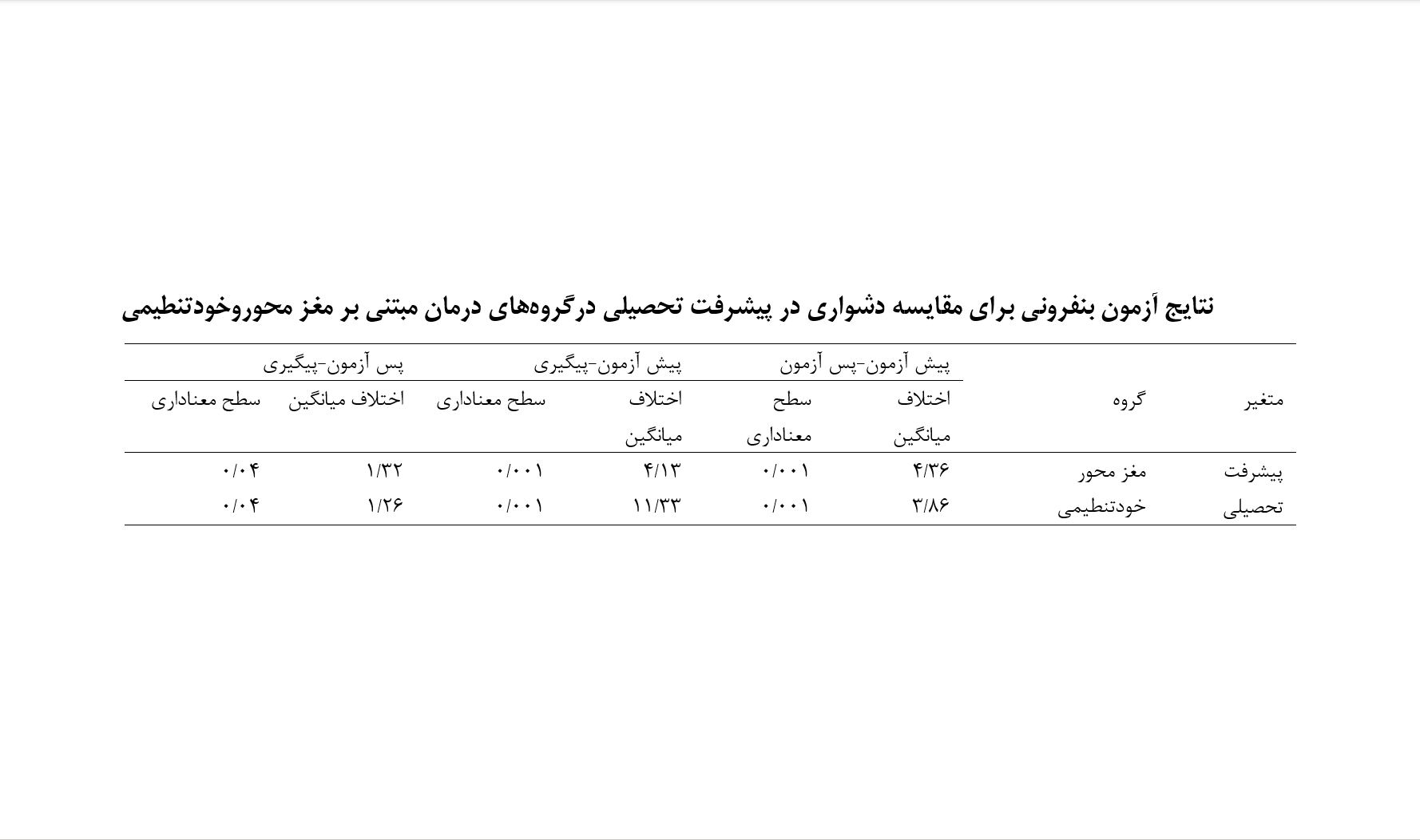Comparison of the Effectiveness of Brain-Based Learning and Self-Regulation Strategies on the Academic Achievement of Students with Specific Learning Disabilities
Keywords:
brain-based learning, self-regulation strategies, academic achievement, specific learning disorderAbstract
This study aims to compare the effectiveness of two educational approaches: brain-based learning and self-regulation strategies, on the academic achievement of students with specific learning disabilities. The current research was conducted using a quasi-experimental method with a pre-test and post-test design and a control group. The statistical population consisted of elementary school students with specific learning disabilities who were randomly assigned to three groups (brain-based learning, self-regulation strategies, and control group). Data collection instruments included questionnaires and standardized academic achievement tests. The findings indicated that both educational interventions significantly improved the academic achievement of students with learning disabilities. The results suggest that both learning approaches can serve as effective tools for enhancing the academic and cognitive capabilities of students with specific learning disabilities. The combination of these two approaches could provide a comprehensive framework for improving learning and cognitive development in these students and contribute to enhancing the quality of education in contemporary educational systems.
Downloads
References
Simin Ghalam M, Ali Bakhshi H, Ahmadi Zadeh Z. Mashhad Journal of Paramedical Sciences and Rehabilitation.
Mashhad Journal of Paramedical Sciences and Rehabilitation. 2016;5(1):7-13.
Jansen RS, Van Leeuwen A, Janssen J, Jak S, Kester L. Self-regulated learning partially mediates the effect of selfregulated learning interventions on achievement in higher education: A meta-analysis. Educational Research Review.
;28:100292. doi: 10.1016/j.edurev.2019.100292.
Kaki M, Sadr A, Alizadeh Monfared SM. The impact of educational justice on academic performance, satisfaction
with education, and academic progress of male high school students in Abdanan city in the 2021-2022 academic year. Research
in Social Studies Education. 2022;4(3):31-50.
Peng P, Fuchs D. A meta-analysis of working memory deficits in children with learning difficulties: Is there a
difference between verbal domain and numerical domain? Journal of Learning Disabilities. 2016;49(1):3-20. doi:
1177/0022219414521667.
Almurumudhe LKA, Mahdad A, Abdulkadhim Johni A, Yousefi Z. The Mediating Role of Self-Esteem in the
Relationship between Psychological Capital, Academic Engagement, and Academic Procrastination with Academic
Performance among Students in Al-Diwaniyah, Iraq. Iranian Journal of Educational Sociology. 2024;7(3):1-9. doi:
61838/kman.ijes.7.3.1.
Lievore R. Let’s Face It! The Role of Social Anxiety and Executive Functions in Recognizing Others’ Emotions From
Faces: Evidence From Autism and Specific Learning Disorders. Development and Psychopathology. 2024:1-13. doi:
1017/s0954579424000038.
Ghazala N, Riffatun NA, Hijab F. Effect of Brain-based Learning on Academic Achievement of VII Graders in
Mathematics. Journal of Elementary Education. 2017;27(2):85-97.
Kirk SA, Gallagher JJ, Anastasiow NJ, Coleman MR. Educating Exceptional Children. Boston: Houghton Mifflin;
Al-Mamari WS, Emam MM, Al-Futaisi AM, Kazem AM. Comorbidity of learning disorders and attention deficit
hyperactivity disorder in a sample of Omani schoolchildren. Sultan Qaboos University Medical Journal. 2015;15(4):e528. doi:
18295/squmj.2015.15.04.015.
Barrett P. Evidence for the impact of classroom design on learning: Implications for practice. Australian Educational
Leader. 2020;42(1):20-3.
Arslani F, Sheikh M, Hemayat Talab R. The effectiveness of a selected motor program on working memory, attention,
and motor skills of students with math learning disabilities. Journal of Rehabilitation Medicine. 2019;8(3):209-20.
Shukla R. Brain-based learning: Optimizing educational methods through brain structure and function. Journal of
Educational Neuroscience. 2023;14(2):101-15.
Peter A. Self-regulation strategies in education: Focusing on students' skills in managing their own learning. Journal
of Educational Psychology. 2023;18(1):67-81.
Dunlosky J, Tauber SK. Metacognitive strategies for effective learning: Planning, monitoring, and self-evaluation.
Annual Review of Psychology. 2016;67:213-38.
Pintrich PR. A conceptual framework for assessing, motivation and self-regulated learning in college students.
Educational Psychology Review. 2004;16:385-407. doi: 10.1007/s10648-004-0006-x.
Van Dillen LF, Papies EK, Hofmann W. Turning a blind eye to temptation: How cognitive load can facilitate selfregulation. Journal of Personality and Social Psychology. 2013;104(3):427-44. doi: 10.1037/a0031262.
Pintrich PR, DeGroot E. Motivational and self-regulated learning component of classroom academic performance.
Journal of Educational Psychology. 1990;82:33-40. doi: 10.1037/0022-0663.82.1.33.
Zimmerman BJ. Self-regulated learning: Theories, Measures, and outcomes. 2015. doi: 10.1016/B978-0-08-097086-
26060-1.
Asgari M, Mirmohammadi SR, Mazloumi A. The effect of self-regulation strategies training on self-concept and math
academic achievement of third-grade female students in Arak. Educational Psychology Quarterly. 2011;21(7):23-44.
Nikpay I, Farahbakhsh S, Yusefvand L. The effect of self-regulation learning strategies (cognitive and metacognitive)
training on goal orientation in second-grade female high school students with a sixty-day follow-up. New Approaches in
Educational Studies. 2016;11(2):71-86.
Zare S, Zeinalipour H, Naseri Jahromi R. The relationship between self-regulated learning strategies and academic
achievement. Research in Medical Education. 2017;9(4):48-56. doi: 10.29252/rme.9.4.57.
Pociask A, Settles J. Increasing student achievement through brain-based strategies: Saint Xavier University; 2007.
Pittman CJ. A study of the relationship between college student experiences and achievement. Virginia: College of
William and Mary; 2014.
Zhao CM, Kuh GD, Carini RM. A comparison of international student and American student engagement in effective
educational practices. The Journal of Higher Education. 2011;76(2):209-31. doi: 10.1080/00221546.2005.11778911.
Lee JK. The effects of self-regulated learning strategies and system satisfaction regarding learner's performance.
Information and Management. 2008;40:133-46. doi: 10.1016/S0378-7206(02)00043-5.
Dortaj F, Lakpour E, Behlouli A. The study of the impact of smart schools in Lorestan province on the academic
achievement of high school students. 8th Edition, Issue 1. 2013:63-71.
Nicholls J. Achievement motivation: A conception of ability, subjective experience, task choice, and performance.
Psychological Review. 1984;91:328-46. doi: 10.1037/0033-295X.91.3.328.

Downloads
Published
Submitted
Revised
Accepted
Issue
Section
License
Copyright (c) 2024 Journal of Study and Innovation in Education and Development

This work is licensed under a Creative Commons Attribution-NonCommercial 4.0 International License.










